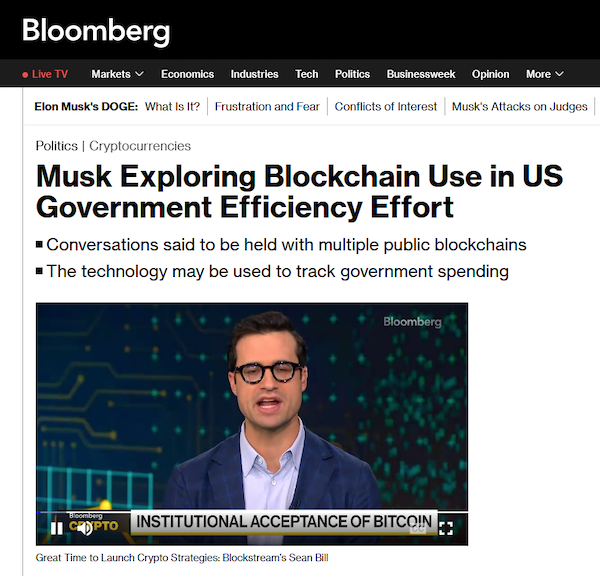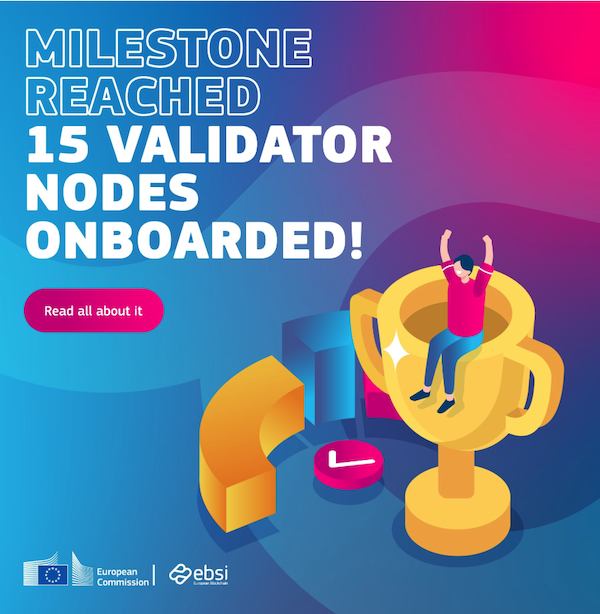Elon Musk hit the headlines in late January for a reported plan
  |
Elon Musk hit the headlines in late January for a reported plan to run parts of the US government on blockchain. The idea became an international story, even though Bloomberg’s sources were anonymous and neither Musk nor the US government announced anything official (Musk did express support for the idea on X however.)
The concept clearly has fans in the crypto community. Coinbase CEO Brian Armstrong posted: “Imagine if every government expenditure was done transparently onchain,” while Binance co-founder Changpeng “CZ” Zhao opined that “all governments should track all their spending on the blockchain, an immutable public ledger.”
There was even speculation about which blockchain platforms Musk could be looking at. “My view is that these will be US-originated chains such as Solana Foundation, Ripple, Sui Foundation, Aptos Foundation, The HBAR Foundation,” posted Lory Kehoe, chief commercial officer at M2.


And just last week, thehead of the Wyoming Stable Token Commission,Anthony Apollo, endorsed a similar proposal to track expenditures through the State Treasurer’s Office using blockchain.
“We are living in interesting times,” Roman Beck, Chester B. Slade professor at the computer information systems department at Bentley University, tells Magazine, “and the notion of placing infrastructure on decentralized rails — a seemingly dry theme — is very important.”
He says that while similar efforts have faltered in Europe, the United States could potentially break new ground.
“What [Europe] lacks and what Washington right now has in excess — it is the political willingness to see things through,” Beck tells Magazine.


European Blockchain Services Infrastructure: A model worth following?
If Musk is looking to research other governments and organizations that have tried to run public agencies on distributed blockchains he might do worse than look to the European Blockchain Services Infrastructure (EBSI), a collaborative effort between the European Blockchain Partnership and the European Commission (EC).
It is a public, permissioned blockchain network built on Hyperledger BESU, which means the public has free access to read the digital ledger, but only authorized parties can write on it.
Launched in 2018, its vision is to leverage blockchain technology to create cross-border services for public administrations, businesses, and citizens “to verify information and make services trustworthy.”
Where EBSI differs from some other governmental blockchain efforts — like Baltic nation Estonia’s, say — is in its decentralized nodal configuration. Blockchain “nodes” typically verify, process and record all transactions across a network. They play a key administrative function.
In the EBSI system, validator nodes are hosted by member states. France runs a node. Slovenia runs a node. Denmark has its own node. And so on.


Any one of EBSI’s 29 member states can propose and sign new blocks on the digital ledger. Brussels, or some other seat of government, doesn’t have the final say on what will be included on the blockchain. In that sense, the system is decentralized.
Beck, who served for six years as Denmark’s representative to EBSI, thinks Musk is “spot on” with his blockchain aspirations (assuming it’s more than just a thought bubble).
“The United States, as a federal system, could benefit enormously from a national blockchain network that streamlines administrative processes across state borders for both individuals and businesses, while protecting their sovereignty,” he posted on LinkedIn in support of the idea, adding:
“Such a network could combine two powerful elements: digital wallets that give citizens control over their personal data through sovereign identity management, and a nationwide blockchain system that makes transactions simple and cost-effective.”
Every US state could have its own blockchain node
Moreover, a “USA chain” could have a nodal framework like EBSI’s, except with individual US states like California, Michigan and Texas running validator nodes. “California is pretty independent, as are the other states,” Beck comments. Importantly, not everything would be controlled from Washington, D.C.
Erwin Voloder, head of policy at the European Blockchain Association (Germany), tells Magazine the idea is feasible:
“It’s not a stretch of the imagination to assume that each [US] state could be a participating node in a [USA chain] network.”
Voloder agrees that blockchain technology could be a powerful tool for reducing wasteful spending, fraud and abuse. “If you put the government’s…
cointelegraph.com
